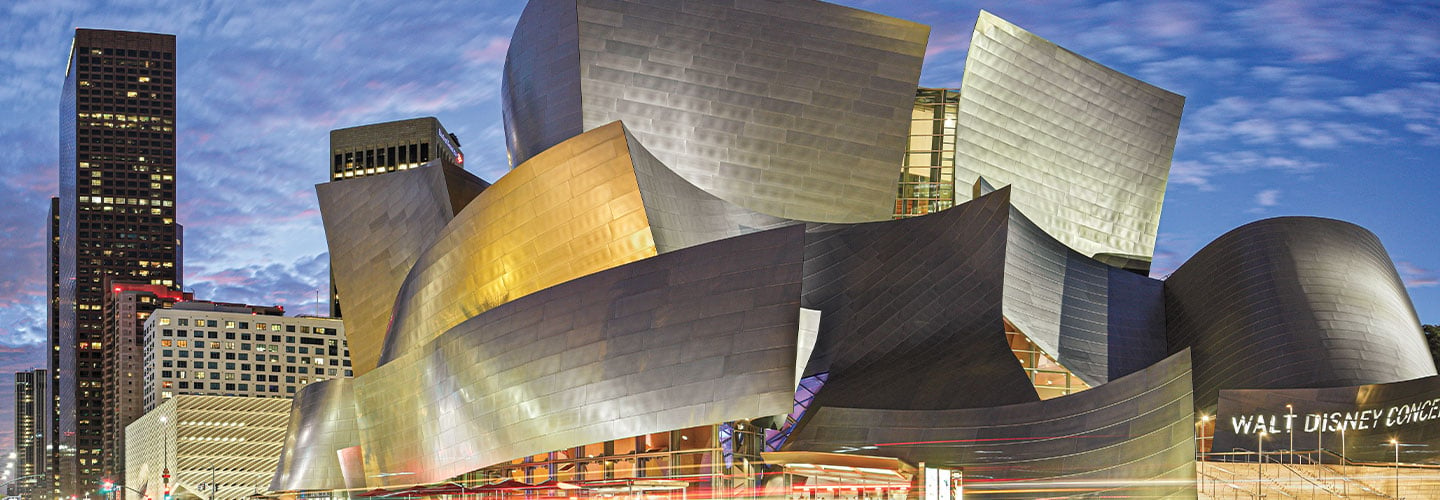The contemporary buildings featured on these pages are unique in their design and the technology used to construct them. Each is immediately identifiable, and the architects who created them are renowned for their vision and skill. Read on to learn what makes each one special.

How did the architect play with light on this building’s façade?
Frank Gehry (b. 1929), Walt Disney Concert Hall, 2003. S. Greg Panosian/Getty Images.
5 Architectural Works to Know
Why are these extraordinary buildings among the most important in the world?
Adrian Smith, George J. Efstathiou, and Marshall Strabala, Burj Khalifa, 2010. Gavin Hellier/Alamy.
What elements did the architect use to provide a sense of greatness?
Burj Khalifa
Year completed: 2010
Location: Dubai, United Arab Emirates
Function: Retail space, offices, residential units, and a hotel
Why it is important: The form of a local desert flower and Islamic architecture inspired the Burj Khalifa’s design. Featuring a foundation made of concrete and steel and a sleek aluminum and glass façade, it is the tallest building in the world. The 160-story building rises 2,716 feet above the Persian Gulf.
Gavin Hellier/Alamy. Santiago Calatrava (b. 1951), Oculus PATH Train Station, 2016. Architectural Photographer/Alamy. Licensed by Artists Rights Society (ARS), New York.
How does this building’s name relate to its design?
The Oculus
Architect: Santiago Calatrava
Year completed: 2016
Location: New York, N.Y.
Function: Transportation hub
Why it is important: The Oculus replaced a train station destroyed during the tragedy of 9/11. Its name means “eye” in Latin, referencing the many skylights along the building’s rooftop. To architect Santiago Calatrava, the construction, which features an exterior made of steel and glass, resembles “a bird released from a child’s hands.”
David Adjaye, Phil Freelon, Zena Howard, and J. Max Bond Jr., National Museum of African American History and Culture, 2016. Serhii Chrucky/Alamy.
How are this building’s form and function related?
Smithsonian National Museum of African American History and Culture
Architects: David Adjaye, Phil Freelon, Zena Howard, and J. Max Bond Jr.
Year completed: 2016
Location: Washington, D.C.
Function: Museum
Why it is important: Located on the National Mall in Washington, D.C., this museum honors the African American experience. The building, more than half of which is underground, is covered with a three-tiered ornamental bronze lattice. It can be modulated to control the amount of sunlight that enters. The building serves as a tribute to African American craftsmanship.
Frank Gehry (b. 1929), Walt Disney Concert Hall, 2003. S. Greg Panosian/Getty Images.
Walt Disney Concert Hall
Frank Gehry, Disney Concert Hall, 2003. David McNew/Getty Images.
Architect: Frank Gehry
Year completed: 2003
Location: Los Angeles, C.A.
Function: Music auditorium
Why it is important: Recognized as one of the most prestigious music auditoriums in the world, the Walt Disney Concert Hall’s exterior is made of gleaming stainless-steel curves that resemble silver sails. Inside, the magnificent main hall features hardwood panels and a sophisticated acoustic design that make this the perfect home for the Los Angeles Philharmonic.
Zaha Hadid (1950-2016), Wangjing Soho, 2009-2014. GuoZhongHua/Shutterstock.
What characteristics make this design corner-less?
Wangjing SOHO
Zaha Hadid, Wangjing Soho, 2009-2014. Bingdian/Getty Images.
Architect: Zaha Hadid
Year completed: 2014
Location: Beijing, China
Function: Retail, entertainment, and office space
Why it is important: Wangjing SOHO’s architect, Zaha Hadid, is the first woman to ever win the most prestigious award in architecture—the Pritzker Architecture Prize, in 2004. The complex consists of three towers inspired by mountains. The contoured structures feature a glass curtain wall system, which is part of the sustainable design.
